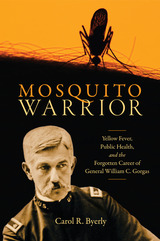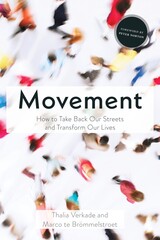447 scholarly books by Seagull Books and 8
start with K
447 scholarly books by Seagull Books and 8
447 scholarly books by Seagull Books
8 start with K start with K
8 start with K start with K
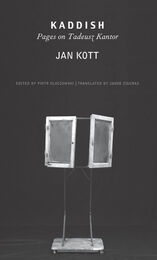
Kaddish
Pages on Tadeusz Kantor
Jan Kott
Seagull Books, 2020
Tadeusz Kantor (1915–90) was renowned for his revolutionary theater performances in both his native Poland and abroad. Despite nominally being a Catholic, Kantor had a unique relationship with Jewish culture and incorporated many elements of Jewish theater into his works. In Kaddish, Jan Kott, an equally important figure in twentieth-century theater criticism, presents one of the most poignant descriptions of what might be called “the experience of Kantor.” At the core of the book is a fundamental philosophical question: What can save the memory of Kantor’s “Theatre of Death”—the Image, or the Word/Logos? Kott’s biblical answer in Kaddish is that Kantor’s theatre can be saved in its essence only by the Word, the Logos. This slim volume, Kott’s final work, is a distilled meditation that casts light on how two of the most prominent figures in Western theater reflected on the philosophy of the stage.
[more]
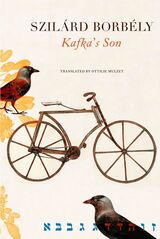
Kafka’s Son
Szilárd Borbély
Seagull Books, 2023
A posthumously published Hungarian masterpiece that reflects on fragmented lives.
Born in 1963, Szilárd Borbély emerged as one of the most important poets of post-communist Europe, exploring the themes of grief, memory, and trauma in his critically acclaimed work. Following the murder of his mother during a burglary in 2000, and the subsequent breakdown and death of his father, Borbély suffered from post-traumatic depression and tragically ended his own life in 2014.
Among the manuscripts that Borbély left behind was Kafka’s Son, a fragmentary work, rendered still more fragmented through the author’s death. Through a series of haunting passages that explore early twentieth-century Prague, including the ruins of the ancient Jewish ghetto during the time of its demolition, Borbély inscribes the story of Franz Kafka and his father onto the city. We are used to hearing from Franz; here Hermann Kafka is also given a voice. “The son,” he tells us, “is the life of the father. The father is the death of the son.” By extension, then, this book is also an indirect telling of the story of Borbély and his father, and about sons and fathers in the Habsburg empire and the culture of brutality that defined Eastern Europe.
A posthumously published Hungarian masterpiece, Kafka’s Son now appears in English in award-winning translator Ottilie Mulzet’s sensitive translation, a fragmentary yet iridescent work inviting us to reflect on our fragmented lives.
Born in 1963, Szilárd Borbély emerged as one of the most important poets of post-communist Europe, exploring the themes of grief, memory, and trauma in his critically acclaimed work. Following the murder of his mother during a burglary in 2000, and the subsequent breakdown and death of his father, Borbély suffered from post-traumatic depression and tragically ended his own life in 2014.
Among the manuscripts that Borbély left behind was Kafka’s Son, a fragmentary work, rendered still more fragmented through the author’s death. Through a series of haunting passages that explore early twentieth-century Prague, including the ruins of the ancient Jewish ghetto during the time of its demolition, Borbély inscribes the story of Franz Kafka and his father onto the city. We are used to hearing from Franz; here Hermann Kafka is also given a voice. “The son,” he tells us, “is the life of the father. The father is the death of the son.” By extension, then, this book is also an indirect telling of the story of Borbély and his father, and about sons and fathers in the Habsburg empire and the culture of brutality that defined Eastern Europe.
A posthumously published Hungarian masterpiece, Kafka’s Son now appears in English in award-winning translator Ottilie Mulzet’s sensitive translation, a fragmentary yet iridescent work inviting us to reflect on our fragmented lives.
[more]
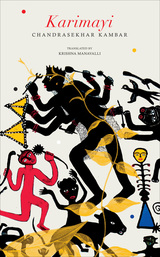
Karimayi
Chandrasekhar Kambar
Seagull Books, 2017
Chandrasekhar Kambar is one of the most accomplished Indian writers working today. In each of Kambar’s novels, the archetypical Mother, Karimayi, is at the center. The narrative of Karimayi moves through an astounding time span, beginning with the mythopoetic times of Goddess Karimayi’s birth and continuing through the historical and cultural shifts in the life of a small rural community called Shivapura during the British colonial era.
Karimayi breaks the familiar narrative of an idyllic and traditional village community being destroyed by the incursion of modernity. Instead, the multilayered narrative of Karimayi weaves everything into itself—the story of the village’s past, the myth of Karimayi, the disorder that sets in with the invasion of colonial modernity and the lure of the city, and, most importantly, of the disruption of another form of “native” modernity that the village community has already begun to incorporate into its rhythms of life. Cleverly challenging colonial cartography, Kambar’s book plays with the idea of an eternal India that exists between myth and reality.
Karimayi breaks the familiar narrative of an idyllic and traditional village community being destroyed by the incursion of modernity. Instead, the multilayered narrative of Karimayi weaves everything into itself—the story of the village’s past, the myth of Karimayi, the disorder that sets in with the invasion of colonial modernity and the lure of the city, and, most importantly, of the disruption of another form of “native” modernity that the village community has already begun to incorporate into its rhythms of life. Cleverly challenging colonial cartography, Kambar’s book plays with the idea of an eternal India that exists between myth and reality.
[more]

Kazimira
Svenja Leiber
Seagull Books, 2024
A gripping and emotionally resonant saga that traces the lives of five generations of resilient women from the late nineteenth century to the dawn of the twenty-first.
Towards the end of the nineteenth century in East Prussia, a woman named Kazimira strolls the remote shores of the Baltic Sea, bringing home bits of amber that wash up on the beach. Her husband Antas is the region’s best carver, and he catches the attention of Moritz Hirschberg, owner of a nearby amber factory. Antas rises through the ranks, but Kazimira has the best ideas for processing and cutting the stones. Although establishing a new mine on such shifting terrain is hazardous, the venture finally pays off. It brings success, but envy and resentment swiftly follow, as antisemitism and nationalism sweep across the German Empire. Kazimira soon learns she must go her own way, as the Hirshbergs are expelled and World War I shatters her son. Three decades later, at the end of World War II, she becomes the last witness of German war crimes committed on West Beach, formerly a place of prosperity and progress.
At the dawn of the twenty-first century in Russia, a woman named Nadia operates an excavator in a massive open-pit amber mine until she is told to go sell trinkets alongside all the other shopgirls. In alternating passages weaving together vastly different eras across the span of a century and a half, Svenja Leiber’s Kazimira tells the story of the largest amber-mining operation in history, and its lasting effects expose pressing questions: Where do hatred and violence come from? What happens when life is declared worthless? Beginning with Kazimira and her bold struggle for self-determination, this saga follows five generations of women who envision an alternative world.
Towards the end of the nineteenth century in East Prussia, a woman named Kazimira strolls the remote shores of the Baltic Sea, bringing home bits of amber that wash up on the beach. Her husband Antas is the region’s best carver, and he catches the attention of Moritz Hirschberg, owner of a nearby amber factory. Antas rises through the ranks, but Kazimira has the best ideas for processing and cutting the stones. Although establishing a new mine on such shifting terrain is hazardous, the venture finally pays off. It brings success, but envy and resentment swiftly follow, as antisemitism and nationalism sweep across the German Empire. Kazimira soon learns she must go her own way, as the Hirshbergs are expelled and World War I shatters her son. Three decades later, at the end of World War II, she becomes the last witness of German war crimes committed on West Beach, formerly a place of prosperity and progress.
At the dawn of the twenty-first century in Russia, a woman named Nadia operates an excavator in a massive open-pit amber mine until she is told to go sell trinkets alongside all the other shopgirls. In alternating passages weaving together vastly different eras across the span of a century and a half, Svenja Leiber’s Kazimira tells the story of the largest amber-mining operation in history, and its lasting effects expose pressing questions: Where do hatred and violence come from? What happens when life is declared worthless? Beginning with Kazimira and her bold struggle for self-determination, this saga follows five generations of women who envision an alternative world.
[more]
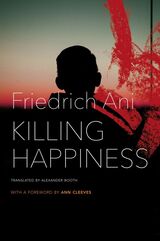
Killing Happiness
Friedrich Ani
Seagull Books, 2021
German author Friedrich Ani combines deep sorrow, human darkness, and breath-taking tension in his latest crime novel.
Happiness is extinguished completely one cold November night when eleven-year-old Lennard Grabbe fails to return home. Thirty-four days later, he is found to have been murdered, and former inspector Jakob Franck, the protagonist of Friedrich Ani’s previous novel The Nameless Day, is entrusted with delivering the most horrible news any parent could ever dream of, setting off a chain reaction of grief among family and friends.
As the special task force is unable to make any progress in the case and the family is unable to deal with the loss, Franck—driven by the need to bring them clarity but also by the painful memories of all the unsolved murder cases from when he was still on active duty—buries himself in witness statements and reports up to the point of exhaustion. He spends hours at the crime scene and employs his special technique of “thought sensitivity,” an abstract, intuitive process that may very well lead him to the “fossil”—that crucial piece of information he needs to solve the case.
Once again, Ani combines deep sorrow, human darkness, and breath-taking tension in a novel whose melancholy can hardly be surpassed.
Happiness is extinguished completely one cold November night when eleven-year-old Lennard Grabbe fails to return home. Thirty-four days later, he is found to have been murdered, and former inspector Jakob Franck, the protagonist of Friedrich Ani’s previous novel The Nameless Day, is entrusted with delivering the most horrible news any parent could ever dream of, setting off a chain reaction of grief among family and friends.
As the special task force is unable to make any progress in the case and the family is unable to deal with the loss, Franck—driven by the need to bring them clarity but also by the painful memories of all the unsolved murder cases from when he was still on active duty—buries himself in witness statements and reports up to the point of exhaustion. He spends hours at the crime scene and employs his special technique of “thought sensitivity,” an abstract, intuitive process that may very well lead him to the “fossil”—that crucial piece of information he needs to solve the case.
Once again, Ani combines deep sorrow, human darkness, and breath-taking tension in a novel whose melancholy can hardly be surpassed.
[more]
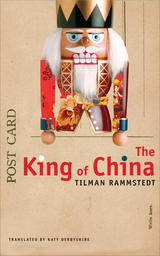
The King of China
Tilman Rammstedt
Seagull Books, 2019
When Keith Stapperpfennig and his family give their grandfather the trip of a lifetime—an all expenses paid holiday to any destination in the world—the eccentric old man arbitrarily chooses China, and he asks Keith to accompany him. But when Keith loses all the money for the journey at a casino, he goes into hiding—mostly under his desk—and his grandfather—equally uninterested in actually traveling to China—heads down the road to engage in a similar subterfuge.
And it is here that the novel opens, two men in hiding, mere miles apart. But when his grandfather dies unexpectedly, Keith is left to continue the farce alone. With the aid of a guidebook, Keith writes a series of letters home to his brothers and sisters, detailing their imaginary travels and the bizarre sights they see. These start off harmlessly, but before long he starts adding invented details: non-stop dental hygiene shows on television, dog vaccinations at the post office—and the letters get longer and longer. Engaging, strange, and ultimately moving, this hilarious novel from Tilman Rammstedt won him the prestigious Ingeborg Bachmann Prize in 2008 and confirmed him as one of Germany’s most compelling writers.
And it is here that the novel opens, two men in hiding, mere miles apart. But when his grandfather dies unexpectedly, Keith is left to continue the farce alone. With the aid of a guidebook, Keith writes a series of letters home to his brothers and sisters, detailing their imaginary travels and the bizarre sights they see. These start off harmlessly, but before long he starts adding invented details: non-stop dental hygiene shows on television, dog vaccinations at the post office—and the letters get longer and longer. Engaging, strange, and ultimately moving, this hilarious novel from Tilman Rammstedt won him the prestigious Ingeborg Bachmann Prize in 2008 and confirmed him as one of Germany’s most compelling writers.
[more]

The Kingdom and the Garden
Giorgio Agamben
Seagull Books, 2020
In a tour-de-force reinterpretation of the Christian tradition, Agamben shows that the Garden of Eden has always served as a symbol for humanity’s true nature.
What happened to paradise after Adam and Eve were expelled? The question may sound like a theological quibble, or even a joke, but in The Kingdom and the Garden, Giorgio Agamben uses it as a starting point for an investigation of human nature and the prospects for political transformation. In a tour-de-force reinterpretation of the Christian tradition, Agamben shows that the Garden of Eden has always served as a symbol of humanity’s true nature. Where earlier theologians viewed the expulsion as temporary, Augustine’s doctrine of original sin makes it permanent, reimagining humanity as the paradoxical creature that has been completely alienated from its own nature. From this perspective, there can be no return to paradise, only the hope for the messianic kingdom. Yet there have always been thinkers who rebelled against this idea, and Agamben highlights two major examples. The first is the early medieval philosopher John Scotus Eriugena, who argued for a radical unity of humanity with all living things. The second is Dante, whose vision of the earthly paradise points towards the possibility of genuine human happiness in this world. In place of the messianic kingdom, which has provided the model for modern revolutionary movements, Agamben contends that we should place our hopes for political change in a return to our origins, by reclaiming the earthly paradise.
What happened to paradise after Adam and Eve were expelled? The question may sound like a theological quibble, or even a joke, but in The Kingdom and the Garden, Giorgio Agamben uses it as a starting point for an investigation of human nature and the prospects for political transformation. In a tour-de-force reinterpretation of the Christian tradition, Agamben shows that the Garden of Eden has always served as a symbol of humanity’s true nature. Where earlier theologians viewed the expulsion as temporary, Augustine’s doctrine of original sin makes it permanent, reimagining humanity as the paradoxical creature that has been completely alienated from its own nature. From this perspective, there can be no return to paradise, only the hope for the messianic kingdom. Yet there have always been thinkers who rebelled against this idea, and Agamben highlights two major examples. The first is the early medieval philosopher John Scotus Eriugena, who argued for a radical unity of humanity with all living things. The second is Dante, whose vision of the earthly paradise points towards the possibility of genuine human happiness in this world. In place of the messianic kingdom, which has provided the model for modern revolutionary movements, Agamben contends that we should place our hopes for political change in a return to our origins, by reclaiming the earthly paradise.
[more]
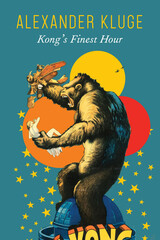
Kong's Finest Hour
A Chronicle of Connections
Alexander Kluge
Seagull Books, 2021
In a world full of devils, the giant ape Kong defends what he loves the most. But who and what is this undomesticated animal? Might it reside within us? As we tread confidently, is this where the earth opens up beneath us?
In Kong’s Finest Hour, Alexander Kluge explores anew the accessible spaces where Kong dwells within us and in our million-year-old past. The more than two hundred stories contained in this volume form a chronicle of connections that together survey these spaces using diverse perspectives. These include stories about the folds of Kong’s nose, the voice of the author’s mother, the poet Heinrich von Kleist and Jack the Ripper, the indestructability of the political, and the supercontinent Pangaea that once unified the earth. Dissolving theory into storytelling has been Kluge’s lifelong pursuit, and this magnificent collection tells stories of people as well of things.
First in a series of Kluge’s Chronicles forthcoming from Seagull Books, Kong’s Finest Hour will delight those familiar with his writing as well as introduce readers to the brilliance of one of Germany’s greatest living writers.
In Kong’s Finest Hour, Alexander Kluge explores anew the accessible spaces where Kong dwells within us and in our million-year-old past. The more than two hundred stories contained in this volume form a chronicle of connections that together survey these spaces using diverse perspectives. These include stories about the folds of Kong’s nose, the voice of the author’s mother, the poet Heinrich von Kleist and Jack the Ripper, the indestructability of the political, and the supercontinent Pangaea that once unified the earth. Dissolving theory into storytelling has been Kluge’s lifelong pursuit, and this magnificent collection tells stories of people as well of things.
First in a series of Kluge’s Chronicles forthcoming from Seagull Books, Kong’s Finest Hour will delight those familiar with his writing as well as introduce readers to the brilliance of one of Germany’s greatest living writers.
[more]
READERS
Browse our collection.
PUBLISHERS
See BiblioVault's publisher services.
STUDENT SERVICES
Files for college accessibility offices.
UChicago Accessibility Resources
home | accessibility | search | about | contact us
BiblioVault ® 2001 - 2024
The University of Chicago Press


